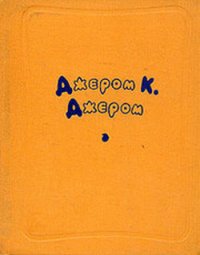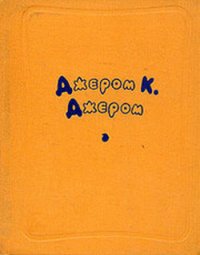My First Book - Jerome Jerome Klapka (полная версия книги txt) 📗

'Hallo, Robinson!' he exclaimed in his surprise, 'you don't mean to say that you—— '
And then he stopped and regarded my youthful appearance very critically.
'Yes, Mr. Kenny—it's a novel,' I said modestly; 'my first.'

'There's plenty of it,' he remarked dryly. 'I'll send it upstairs at once. And I'll wish you luck, too; but,' he added, kindly preparing to soften the shock of a future refusal, 'we have plenty of these come in—about seven a day—and most of them go back to their writers again.'

'Ye-es, I suppose so,' I answered, with a sigh.
For a while, however, I regarded the meeting as a happy augury—a lucky coincidence. I even had the vain, hopeless notion that Mr. Kenny might put in a good word for me, ask for special consideration, out of that kindly feeling which we had for each other, and which chess antagonists have invariably for each other, I am inclined to believe. But though we met three or four times a week, from that day forth not one word concerning the fate of my manuscript escaped the lips of Mr. Kenny. It is probable the incident had passed from his memory; he had nothing to do with the novel department itself, and the delivery of MSS. was a very common everyday proceeding to him. I was too bashful, perhaps too proud, an individual to ask any questions; but every evening that I encountered him I used to wonder 'if he had heard anything,' if any news of the book's fate had reached him, directly or indirectly; occasionally even, as time went on, I was disposed to imagine that he was letting me win the game out of kindness—for he was a gentle, kindly soul always—in order to soften the shock of a disappointment which he knew perfectly well was on its way towards me.

Some months afterwards, the fateful letter came to me from the firm, regretting its inability to make use of the MS., and expressing many thanks for a perusal of the same—a polite, concise, all-round kind of epistle, which a publisher is compelled to keep in stock, and to send out when rejected literature pours forth like a waterfall from the dusky caverns of a publishing house in a large way of business. It was all over, then—I had failed! From that hour I would turn chess player, and soften my brain in a quest for silver cups or champion amateur stakes. I could play chess better than I could write fiction, I was sure. Still, after some days of dead despair, I sent the MS. once more on its travels—this time to Smith & Elder's, whose reader, Mr. Williams, had leapt into singular prominence since his favourable judgment of Charlotte Bronte's book, and to whom most MSS. flowed spontaneously for many years afterwards. And in due course of time, Mr. Williams, acting for Messrs. Smith & Elder, asked me to call upon him—for the MS.!—at Cornhill, and there I received my first advice, my first thrill of exultation. 'Presently, and probably, and with perseverance,' he said, 'you will succeed in literature, and if you will remember now, that to write a good novel is a very considerable achievement. Years of short story-writing is the best apprenticeship for you. Write and rewrite, and spare no pains.' I thanked him, and I went home with tears in my eyes of gratitude and consolation, though my big story had been declined with thanks. But I did not write again. I put away my MS., and went on for six or eight hours a day at chess for many idle months before I was in the vein for composition, and then, with a sudden dash, I began 'The House of Elmore.' It was half finished when another strange incident occurred. I received one morning a letter from Lascelles Wraxall (afterwards Sir Lascelles Wraxall, Bart., as the reader may be probably aware), informing me that he was one of the readers for Messrs. Hurst & Blackett, and that it had been his duty some time ago to decide unfavourably against a story which I had submitted to the notice of his firm, but that he had intended to write to me a private note urging me to adopt literature as a profession. His principal object in writing at that time was to suggest my trying the fortunes of the novel, which he had already read, with Messrs. Routledge, and he kindly added a letter of introduction to that firm in the Broadway—an introduction which, by the way, never came to anything.

Poor Lascelles Wraxall, clever writer and editor, press-man and literary adviser, real Bohemian and true friend—indeed, everybody's friend but his own—I look back at him with feelings of deep gratitude. He was a rolling stone, and when I met him for the first time in my life, years afterwards, he had left Marlborough Street for the Crimea; he had been given a commission in the Turkish Contingent at Kertch; he had come back anathematising the Service, and 'chock full' of grievances against the Government, and he became once more editor and sub-editor, and publisher's hack even, until he stepped into his baronetcy—an empty title, for he had sold the reversion of the estates for a mere song long ago—and became special correspondent in Austria for the Daily Telegraph. And in Vienna he died, young in years still—not forty, I think—closing a life that only wanted one turn more of 'application,' I have often thought, to have achieved very great distinction. There are still a few writing men about who remember Lascelles Wraxall, but they are 'the boys of the old brigade.'

It was to Lascelles Wraxall I sent, when finished, 'The House of Elmore,' as the reader may very easily guess. Wraxall had stepped so much out of his groove—for the busy literary man that he was—to take me by the hand, and point the way along 'the perilous road;' he had given me so many kind words, that I wrote my hardest to complete my new story before I should fade from his recollection. The book was finished in five weeks, and in hot haste, and for months again I was left wondering what the outcome of it all was to be; whether Wraxall was reading my story, or whether—oh, horror!—some other reader less kindly disposed, and more austere and critical, and hard to please, had been told off to sit in judgment upon my second MS.

I went back to chess for a distraction till the fate of that book was pronounced or sealed—it was always chess in the hours of my distress and anxiety—and I once again faced Charles Kenny, and once again wondered if he knew, and how much he knew, whilst he was deep in his king's gambit or his giuoco piano; but he was not even aware that I had sent in a second story, I learned afterwards. And then at last came the judgment—the pleasant, if formal, notice from Marlborough Street that the novel had been favourably reported upon by the reader, and that Messrs. Hurst & Blackett would be pleased to see me at Marlborough Street to talk the matter of its publication over with me. Ah! what a letter that was!—what a surprise, after all!—what a good omen!
And some three months afterwards, at the end of the year 1854, my first book—but my second novel—was launched into the reading world, and I have hardly got over the feeling yet that I had actually a right to dub myself a novelist!




